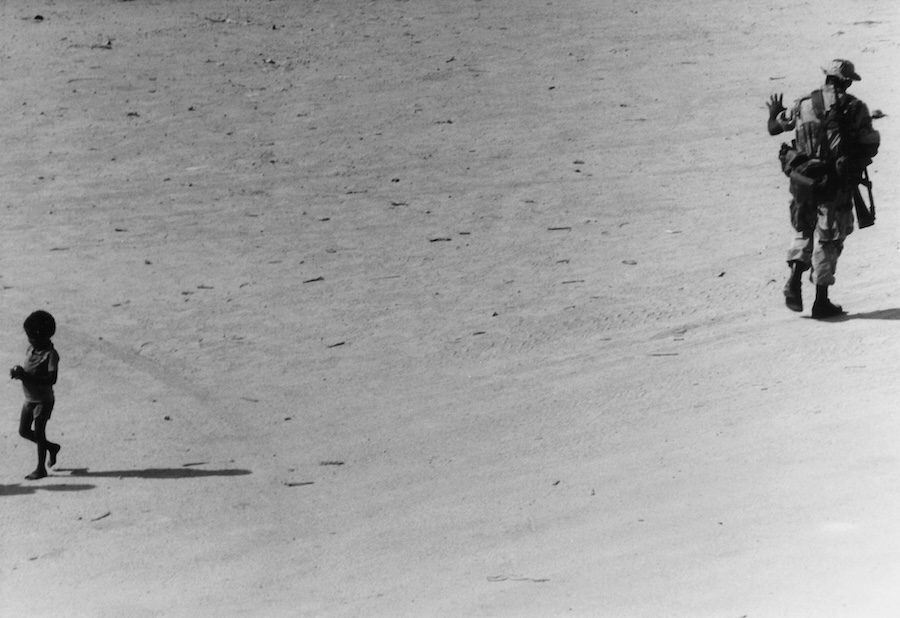
*Editor’s note: “Stop covering politics,” some of our dear readers cry every time we post something relephant. Look: politics are life. Equal rights, empathy, fair economy, healthcare. We can’t ignore what’s happening, and you shouldn’t either. Disagree? We’re happy to share your experience here.
~
The baby’s breath is shallow, rattling with each exhale.
I watch as her mother, Amal, holds her tightly against her chest, whispering prayers into the dark curls at her temple. The clinic in Sarmada, Syria, has shut down—another casualty of America’s foreign aid freeze.
There is no medicine. No doctor. No hope. Amal knows what’s coming, but she rocks her baby anyway, humming a lullaby she will never hear again.
This is not an isolated tragedy. It is a policy decision, made in Washington, thousands of miles away.
On January 20, 2025, President Donald Trump signed Executive Order 14169, initiating a 90-day pause on all U.S. foreign development assistance. This decision, paired with the dismantling of the U.S. Agency for International Development (U.S.A.I.D.), has already unraveled fragile humanitarian safety nets, plunging millions deeper into crisis.
This freeze is not neutral—it is an active choice to let people starve, to shutter hospitals, to strip vulnerable communities of essential aid.
But the consequences of abandonment do not stop at the borders of Sudan, Gaza, or Somalia. They will come back to haunt the United States.
The Karmic Ripple of Abandonment
Eastern philosophy teaches that suffering is not an isolated phenomenon but part of a web of interdependence. The Buddhist principle of Pratītyasamutpāda—dependent origination—states that all suffering arises from interconnected causes.
When the U.S. freezes humanitarian aid, it does not create neutrality—it creates suffering.
A famine in South Sudan becomes a refugee crisis in Europe.
A collapsed health system in Yemen fuels extremist recruitment.
A cut in food aid to Somalia leads to a new wave of piracy, instability, and regional war.
Confucian philosophy warns against governance that fails in benevolence. A state that turns its back on suffering creates instability, leading to its own decline. Laozi’s Dao De Jing cautions that a leader who governs without compassion weakens their foundation.
The U.S. retreat from humanitarian aid is not just an economic or strategic failure—it is a moral collapse with consequences that will return to haunt it.
American Doctrinal Philosophy: the Collapse of Moral Leadership
The U.S. has long justified its global influence on the basis of moral leadership, a doctrine dating back to John Winthrop’s 1630 sermon, describing America as a “City upon a Hill”—a nation with a divine obligation to lead by example.
This ethos later underpinned Woodrow Wilson’s Moral Diplomacy, arguing that America’s engagement in the world should be guided by moral principles rather than self-interest alone.
The current aid freeze shatters this foundational belief. If the U.S. refuses to uphold its own self-imposed moral standard, what remains of its claim to global leadership? How does the world view a country that proclaims itself a beacon of democracy—yet abandons the starving, sick, and displaced?
Lessons from History: the Cost of Neglect
The U.S. foreign aid freeze follows a dangerous precedent. In the 1980s, the Reagan administration cut aid to Central America, leading to migration waves, economic collapse, and the rise of violent cartels.
During the 1990s, failure to intervene in the Balkans allowed mass atrocities, war, and genocide to unfold. According to a Harvard Kennedy School study, the lack of stable economic investment contributed directly to the rise of organized crime, increasing long-term U.S. border security costs.
In 2021, the U.S. withdrew aid from Afghanistan, and the Taliban seized power within days.
These historical lessons prove that cutting aid doesn’t isolate America—it destabilizes the world, forcing the U.S. into costlier crises later.
From Humanitarianism to Hypocrisy: the Selective Morality of U.S. Foreign Policy
If this aid freeze were consistent, it would still be devastating—but at least ideologically coherent. Instead, it is selective, politically motivated, and deeply hypocritical.
A total of $61 billion in military aid to Ukraine was fast-tracked, while food assistance for famine-stricken regions was frozen.
The Gaza humanitarian crisis worsens, yet the U.S. increased military support to Israel while blocking funding for Palestinian relief efforts.
Somalia’s largest aid organizations, serving over a million displaced people, have been paralyzed, while military partnerships remain intact.
This selective compassion is not only unethical—it is strategically shortsighted.
China gains influence in Africa and the Global South. Russia exploits instability, offering alternative aid with political strings attached. Terrorist organizations distribute food and medical aid in exchange for allegiance.
“The whole system is shaking,” said a former U.S. diplomat. “This does not make America safer. It makes the world more dangerous.”
The Next Wave of Global Consequences
The U.S. withdrawal from humanitarian aid programs will not occur in isolation—it will reshape geopolitical alignments, fuel conflict zones, and drive domestic consequences that cannot be ignored.
Will China and Russia fill the vacuum left by U.S. withdrawal? Yes—and they already are.
China and Russia have been expanding their global influence through strategic humanitarian and infrastructure investments for years, and the U.S. aid freeze gives them an unprecedented opportunity to cement their dominance in key regions.
China’s Belt and Road Initiative (BRI) is no longer just about infrastructure—it now includes medical aid, food distribution, and crisis intervention programs.
Russia has been leveraging military and humanitarian aid in conflict zones, presenting itself as a “stabilizing force” in Syria, Africa, and Latin America.
By stepping into the humanitarian void left by the U.S., China and Russia will be able to redefine global power balances in critical areas:
Africa: China has aggressively expanded food security projects and medical infrastructure in Africa, outpacing Western NGOs.
Latin America: Russia has deepened energy and security partnerships, filling gaps left by diminished U.S. support.
The Middle East: With less U.S. aid flowing into post-conflict zones, China’s investments in Gulf states and Iran will further sideline American influence.
Could this shift power balances in Africa, the Middle East, and Latin America? Yes, and this shift is already underway.
Africa’s pivot toward China is accelerating. China’s debt-relief programs, trade partnerships, and direct investment in agricultural development now eclipse traditional Western aid models.
The Middle East will see rising Chinese influence, as China has already brokered key diplomatic agreements in the region, and a weakened U.S. humanitarian presence further diminishes Washington’s role.
Latin America may witness increasing Russian intervention. With U.S. engagement fading, Russia has increased arms sales and economic partnerships in Venezuela, Nicaragua, and Brazil. The U.S. is losing the ability to dictate terms in these regions, and without humanitarian engagement, diplomatic influence weakens—and alternative power structures take hold.
Terrorism and Conflict Impact.
Will Al-Shabaab, ISIS, and other extremist groups use the crisis to recruit?
Yes—terrorist organizations have historically thrived in the vacuum left by humanitarian neglect.
When local governments fail to provide basic services, extremist groups step in offering food, security, and medical aid in exchange for loyalty.
A 2024 RAND Corporation security assessment warns that when humanitarian support is withdrawn from fragile regions, terrorist recruitment increases by as much as 70 percent.
This was a key recruitment tool for ISIS in Syria. The group provided food and medicine when state systems had collapsed, bringing thousands into its ranks.
In Somalia, Al-Shabaab fills the void where Western aid has disappeared. Already, intelligence reports indicate that Al-Shabaab is increasing its food distribution networks in rural Somalia, directly targeting populations affected by the U.S. aid freeze.
Will Israel’s intensified bombing campaign in Gaza escalate if no U.S. humanitarian mediation exists? Without U.S. diplomatic mediation, Gaza’s humanitarian situation will reach catastrophic levels, further escalating regional instability.
The U.S. has historically played a role in controlling escalation by mediating ceasefires and ensuring basic humanitarian provisions continue. But the aid freeze removes key leverage points. If the U.S. is no longer providing humanitarian relief, it also loses diplomatic leverage over Israeli military actions.
Without the U.S., will another power—such as China or Russia—step in to broker agreements?
If the aid freeze continues, Israel’s military campaign is more likely to intensify, with humanitarian groups warning of unprecedented civilian casualties.
U.S. Domestic Policy Implications
Could this lead to increased migration toward U.S. borders due to destabilized regions?
Absolutely. The direct consequence of humanitarian neglect is displacement—and as history shows, displacement crises do not stay contained.
The 1980s U.S. aid cuts to Central America led to record migration waves.
The U.S. withdrawal from Afghanistan triggered mass refugee flows.
Sudan, Yemen, and the Sahel region are now entering crisis-level famine conditions—which will inevitably force millions to seek safety elsewhere.
If U.S. aid withdrawal further destabilizes food and medical supplies in the Global South, the migration pressure on U.S. borders will surge.
And how will public opinion shift if major famine-level events occur due to aid cuts?
Public opinion in the U.S. is often reactive—meaning support for humanitarian intervention usually spikes only after visible catastrophes.
In 1993, images of starvation in Somalia forced the U.S. to intervene militarily.
In 2015, the global refugee crisis shifted European policies overnight.
A major famine in Africa or the Middle East could trigger a sudden reversal in American policy—at a much higher cost.
The question is: Will the political establishment act preemptively, or will it wait until the crisis is irreversible?
A Nation in Retreat
This is not just an aid freeze—it is a global power shift.
China and Russia are capitalizing on America’s withdrawal.
Extremist groups are filling the humanitarian void.
U.S. borders will see the consequences of global displacement.
Once America steps back from the world, the world does not wait.
Buddhism warns that karma does not forget. The suffering inflicted today will return—whether in global instability, lost alliances, or in the moral reckoning of a nation that once stood for something greater than itself.
The choice is clear.
But will America make it?
~

 Share on bsky
Share on bsky






Read 0 comments and reply